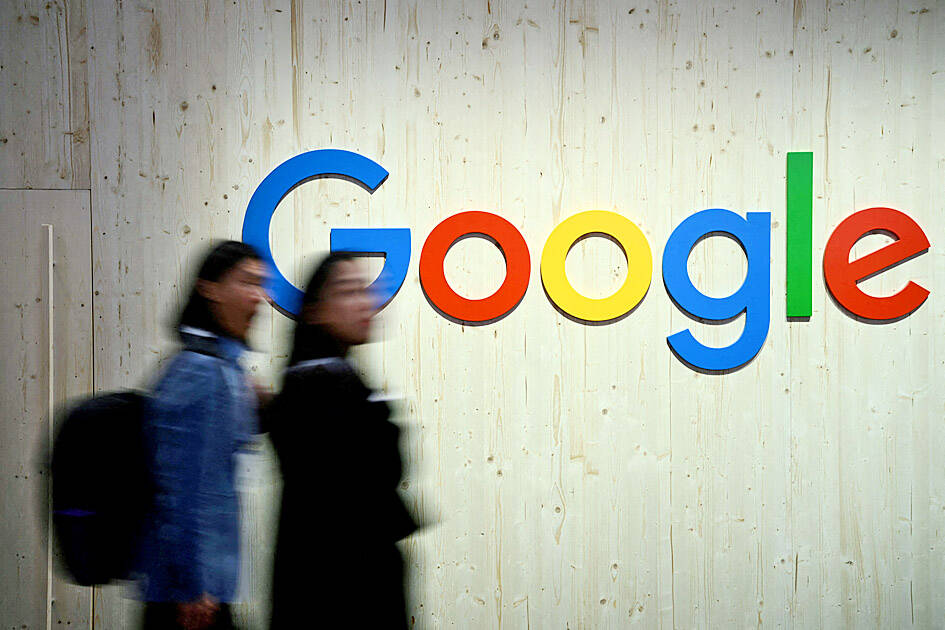Google yesterday won a court challenge against a 1.49 billion euro (US$1.66 billion) EU antitrust fine imposed five years ago that targeted its online advertising business.
The EU’s General Court said it was throwing out the 2019 penalty imposed by the European Commission, which is the 27-nation bloc’s top antitrust enforcer.
“The General Court annuls the Commission’s decision in its entirety,” the court said in a news release.

Photo: Reuters
The commission’s ruling applied to a narrow portion of Google’s ad business: Ads that the US tech giant sold next to Google search results on third-party Web sites.
Regulators had accused the Alphabet Inc unit of inserting exclusivity clauses in its contracts that barred these Web sites from running similarly placed ads sold by Google’s rivals. The commission said when it issued the penalty that Google’s behavior resulted in advertisers and Web site owners having less choice and likely facing higher prices that would be passed on to consumers.
However, the court said the commission “committed errors” when it assessed those clauses. The commission failed to demonstrate that Google’s contracts deterred innovation, harmed consumers or helped the company hold on to and strengthen its dominant position in national online search advertising markets, it said.
The ruling can be appealed, but only on points of law, to the EU’s Court of Justice, the bloc’s top court.
The commission said in a brief statement that it would carefully study the judgement and reflect on possible next steps.
Google said it changed its contracts in 2016 to remove the provisions in question, even before the commission imposed its decision.
“We are pleased that the court has recognized errors in the original decision and annulled the fine,” Google said in a statement. “We will review the full decision closely.”
The company’s legal victory comes a week after it lost a final challenge against a separate EU antitrust case for its shopping comparison service that also involved a hefty fine.
They were among three antitrust penalties totaling about 8 billion euros that the commission imposed against Google in the previous decade. The penalties marked the beginning of an era of intensifying scrutiny for tech companies.
Google has faced escalating pressure on both sides of the Atlantic over its digital ad business. It is battling the US Department of Justice in a US federal court over allegations that its dominance over the technology that controls the sale of billions of Internet display ads constitutes an illegal monopoly.
UK competition regulators this month accused the company of abusing its dominance in the country’s digital ad market and giving preference to its own services.
EU antitrust enforcers carrying out their own investigation suggested last year that breaking up the company was the only way to satisfy competition concerns about its digital ad business.

Taiwan Semiconductor Manufacturing Co (TSMC, 台積電) last week recorded an increase in the number of shareholders to the highest in almost eight months, despite its share price falling 3.38 percent from the previous week, Taiwan Stock Exchange data released on Saturday showed. As of Friday, TSMC had 1.88 million shareholders, the most since the week of April 25 and an increase of 31,870 from the previous week, the data showed. The number of shareholders jumped despite a drop of NT$50 (US$1.59), or 3.38 percent, in TSMC’s share price from a week earlier to NT$1,430, as investors took profits from their earlier gains

In a high-security Shenzhen laboratory, Chinese scientists have built what Washington has spent years trying to prevent: a prototype of a machine capable of producing the cutting-edge semiconductor chips that power artificial intelligence (AI), smartphones and weapons central to Western military dominance, Reuters has learned. Completed early this year and undergoing testing, the prototype fills nearly an entire factory floor. It was built by a team of former engineers from Dutch semiconductor giant ASML who reverse-engineered the company’s extreme ultraviolet lithography (EUV) machines, according to two people with knowledge of the project. EUV machines sit at the heart of a technological Cold

TAIWAN VALUE CHAIN: Foxtron is to fully own Luxgen following the transaction and it plans to launch a new electric model, the Foxtron Bria, in Taiwan next year Yulon Motor Co (裕隆汽車) yesterday said that its board of directors approved the disposal of its electric vehicle (EV) unit, Luxgen Motor Co (納智捷汽車), to Foxtron Vehicle Technologies Co (鴻華先進) for NT$787.6 million (US$24.98 million). Foxtron, a half-half joint venture between Yulon affiliate Hua-Chuang Automobile Information Technical Center Co (華創車電) and Hon Hai Precision Industry Co (鴻海精密), expects to wrap up the deal in the first quarter of next year. Foxtron would fully own Luxgen following the transaction, including five car distributing companies, outlets and all employees. The deal is subject to the approval of the Fair Trade Commission, Foxtron said. “Foxtron will be

INFLATION CONSIDERATION: The BOJ governor said that it would ‘keep making appropriate decisions’ and would adjust depending on the economy and prices The Bank of Japan (BOJ) yesterday raised its benchmark interest rate to the highest in 30 years and said more increases are in the pipeline if conditions allow, in a sign of growing conviction that it can attain the stable inflation target it has pursued for more than a decade. Bank of Japan Governor Kazuo Ueda’s policy board increased the rate by 0.2 percentage points to 0.75 percent, in a unanimous decision, the bank said in a statement. The central bank cited the rising likelihood of its economic outlook being realized. The rate change was expected by all 50 economists surveyed by Bloomberg. The